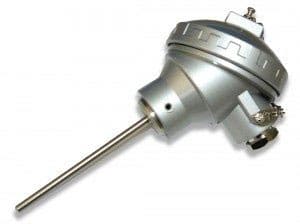There are many different types of thermocouples. Each of the thermocouple types are given a coding letter to denote each of the alloy combinations. The most common code letters are K, J, T and N. Other types include R, S, E, B, C, G and W.
Each type of thermocouple has its own alloy pair which is carefully selected and calibrated to meet the international standards with which we must comply. The standard that governs thermocouples in the UK and Europe is BS EN 60584 and ASTM Standard E230, which provides specifications for the common industrial grades, including the letter designations used for each type of thermocouple. These standards ensure accuracy and consistency in temperature measurement.
A thermocouple consists of a welded ‘hot’ junction between two dissimilar metals. These are usually wires with a reference junction at the opposite end.
The thermocouple type is suited to different applications and temperature ranges. See the table below for appropriate operating ranges.

Type J
Thermocouple





